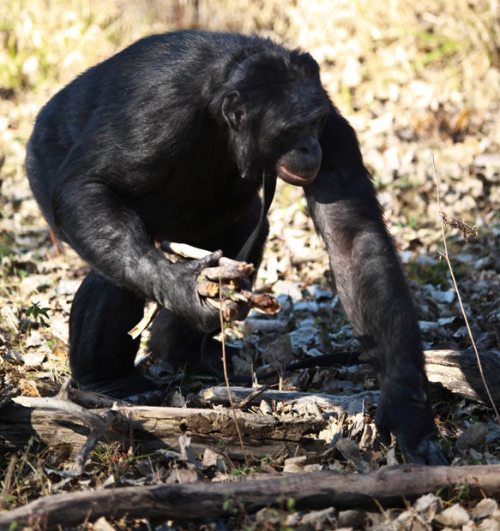Chimps have most of the mental capabilities needed to cook food, a new research suggests.
According to the study, published in The Royal Society Proceedings B, the ability to cook food is deep seated and may have arisen in human ancestors millions of years ago.
Cooking requires a set of sophisticated cognitive abilities, including causal reasoning, self-control and anticipatory planning.
The conclusions also indicate that humans may have developed the ability to cook very soon after they learned how to control fire.
Even boiling an egg requires advanced mental skills. Whereas other animals tend to start eating whatever food they find or hunt straight away, humans can store and cook their food, even if we are fairly hungry, because we know that if we wait what we eventually eat will taste better.
It seems that our ability to smack our lips at the prospect of a delicious, well prepared meal requires a similar inspired leap of the imagination as producing art, developing language and creating the technologies that make us uniquely human.
Dr. Felix Warneken of Harvard University conducted a simian MasterChef contest in which he conducted a series of experiments on chimpanzees to see whether they had what it took to be cooks.
Clearly chimps can’t cook and so there was no point in giving them a bag of shopping and letting them loose in a kitchen with assorted pots and pans, amusing though the spectacle might have been.
Instead, Dr. Felix Warneken carried out a series of experiments to test the individual cognitive skills the chimps needed to be able to cook. He looked to see if they preferred cooked rather than raw food, whether they could wait until raw food could be cooked and if they would put raw food into a box that scientists switched for cooked food. He found that they passed all these tests and more.
So why don’t chimps cook? Not being able to control fire is one reason and another, according to Dr. Felix Warneken, is that cooking requires what he describes as “social skills” that chimps don’t possess.
By social skills he is not alluding to their unremarkable table manners nor their lack of witty dinner party conversation. Rather, it is their inability to trust others in their social groups not to steal their food while they are preparing to cook it that he is referring and it is this he believes is one of the key factors holding them back from being able to cook. Gulping something down as soon as you have foraged it is the surest way of keeping it safe.
Dr. Felix Warneken’s experiments show that that most of the mental skills needed to cook were there in human ancestors between 5 to 7 million years ago and so all it took for the first emergence of the culinary arts was the controlled use of fire and the ability to trust other people not to pinch our food while our back was turned.
The motivation for the study was to investigate a controversial theory that cooking was necessary for human brains to become larger. The idea by the primatologist Prof. Richard Wrangham, also at Harvard, is that cooking enabled our ancestors to eat more protein, which helped our ancestors develop their brains.
The results indicate that early humans had everything in place once they had learned to control fire and so, according to Dr. Felix Warneken, supports Prof. Richard Wrangham’s ideas.
Experts in human evolution say that they find it “interesting” that chimpanzees and humans share several of the essential psychological capacities needed, but believe that the chimp study does not add much new information to the human story.
